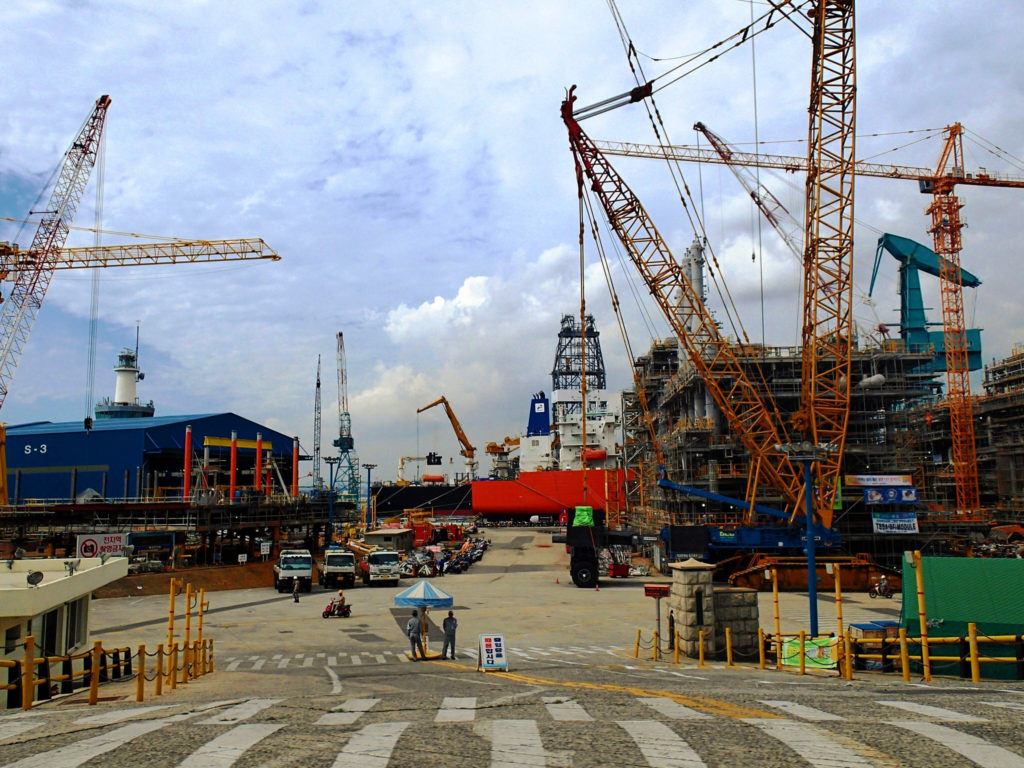The Peninsula
Looking Beyond the Playbook

By Yong Kwon
There is a perception that the Moon administration’s adoption of heterodox policies has made it more difficult for South Korea to overcome the current economic downturn. In particular, the minimum wage increase has been singled out as evidence of the government’s untested approach to tackling low growth and unemployment. However, this is a mischaracterization of the government’s outlook and actions. A key factor holding back the recovery may actually be President Moon’s faithfulness to the policy tools that preceding administrations have used to address economic challenges.
An overview of the administration’s recent policy measures reveals that they are not out of sync with past efforts.
In response to weak global demand, the Korean government has acted as a buyer of last resort to keep exporters afloat, notably shipbuilders. With the glut of container vessels in the market reducing the number of new orders, the government has extended financial support to Hyundai Merchant Marines to purchase new megaships from domestic companies. Although this subsidy created frictions with the European Union and Japan, Seoul considered these measures essential to ensure the survival of local parts makers. This is reminiscent of measures that South Korea undertook during the oil crises of the 1970s and 80s to sustain the operations of national champions until global demand recovered.
Seoul is also proactively engaging with foreign governments to expand export opportunities. In addition to successfully renegotiating the Korea-U.S. Free Trade Agreement, the Korean government has been particularly focused on the Middle East. There were concerns early in President Moon’s term that his pledge to phase out domestic nuclear power plants at home would jeopardize the landmark nuclear energy project in the UAE that was secured under the Lee Myung-bak administration. However, by reaffirming commitments to broaden ties with the UAE, the Blue House assured that the project would not only proceed, but also potentially grow. Moreover, using this project as a benchmark, the Moon government has also been forward leaning on opportunities in Saudi Arabia.
Meanwhile, the government is also actively shaping regulations and providing financial resources to assist domestic firms striving to become first movers in innovative sectors. The Korean government’s long-standing support for enterprise application of Artificial Intelligence is beginning to bear fruit with the country’s nuclear reactor exporters adopting the technology for supply-side controls. This innovative solution to proliferation concerns received praise from the Bulletin of Atomic Scientists. More recently, the Moon government has turned its attention to blockchain technology. In addition to upholding the ties that cryptocurrency exchange markets have with traditional banks, Seoul is actively considering permitting Initial Coin Offerings to take place to further encourage investment in this new field. This comes despite concerns from financial regulators earlier this year that such moves may destabilize the market.
Moreover, the government is actively supporting innovative companies by showcasing their products in public institutions. Myongji Hospital, which has collaborated closely with the Ministry of Health and Welfare in the past, partnered with the technology company BICube to integrate blockchain technology in its medical exchange system. This mirrors past efforts undertaken by the government to bolster the robotics industry by integrating smart robots in classrooms, generating domestic interest and demand for the nascent industry.
As evidenced by these measures, policies undertaken by the incumbent Korean administration do not diverge greatly from those advanced by past governments. However, the problem may be that these toolsets are insufficient to jumpstart economic growth today.
The Korean government has yet to find a corrective for the country’s overexposure to global demand. More specifically, it has not found a way to transform the dependent relationship that local parts suppliers have with conglomerates that might reduce shocks that are currently transferred to small and medium enterprises when flagship exporters underperform abroad. This remains a particularly acute problem as SMEs employ most of the country’s workforce.
And while the administration continues to rely on conglomerates to act as champions of the Korean economy, not all of them have been proactive in embracing innovative sectors. For instance, the steel giant POSCO recently announced plans to retrench in their traditional industries rather than expand into emerging technologies like lithium and biopharmaceuticals. Indeed, it might not be wholly appropriate either for the government to expect companies in established industries to overextend.
Even the government’s approach to increasing the minimum wage seems misaligned with the challenges in the labor market, not necessarily because it imposes an undue burden on the private sector as is often claimed – but because institutions and processes built to adjudicate management-labor disputes remain fragile. If the administration aims to make sure that wage growth keeps pace with increases in domestic productivity, workers need stronger collective bargaining positions.
Structural reform is a daunting task. Nonetheless, these underlying conditions have to be addressed for the economy to experience a truly transformative outcome. President Moon may need to become as radical as he is often accused of being.
Yong Kwon is the Director of Communications at the Korea Economic Institute of America. The views expressed here are the author’s alone.
This image originally posted to Flickr by SarahTz and licensed by Wikimedia Commons
